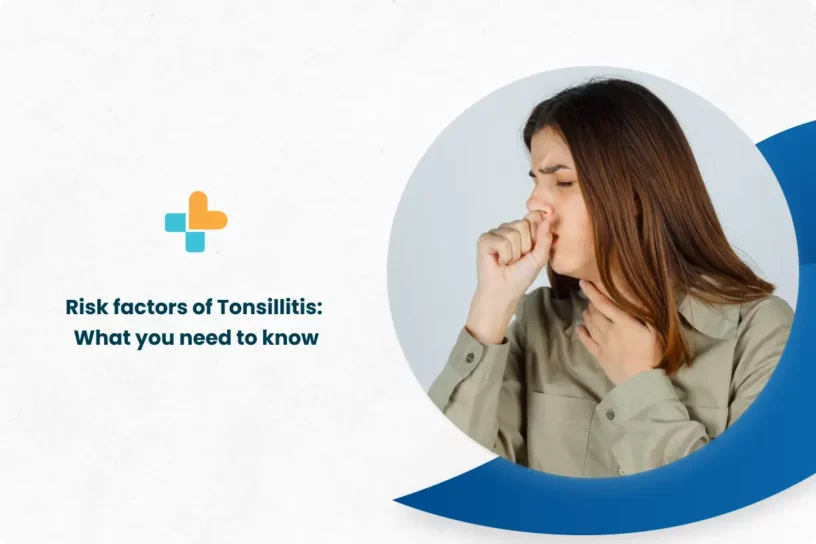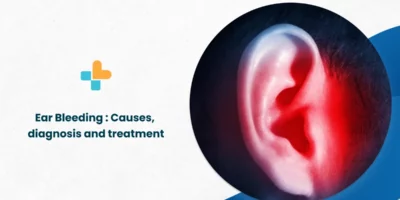The majority of us are aware of tonsillitis, but we usually never give it much consideration. This is a big mistake since it impacts many people, especially the adult population. Most of all have suffered from a tonsil infection at least once in life. To effectively counter the condition, you must be informed of the risk factors of tonsillitis and the treatment options available. Worry no more, since this blog will clear all doubts and discuss all the things you need to know.
What is tonsillitis?
Tiny glands called tonsils are located on either side of the throat’s back. The term “tonsillitis” refers to an infection and/or inflammation of these tonsils. This most frequent tonsillitis results from a viral illness and sporadically from bacterial infection. It is one of the most common paediatric illnesses worldwide. Adults could also be impacted, particularly those with weakened immune systems.
What are the common causes of tonsillitis?
Tonsils are included in the first line of defence of the body’s immunity. Owing to their convenient location, they prevent the entry of germs via mouth or nose. Being a storehouse of white blood cells, they help in killing pathogens. Bacteria are the most common group of pathogens causing tonsillitis, however, viral infections are also responsible at times.
Can bacterial infections cause tonsillitis?
Although rare, bacterial infections can surely cause tonsillitis. The most common bacterial species involved in this is Group A Streptococcus bacteria. Some other species include Neisseria and Haemophilus influenzae.
Symptoms of tonsillitis
Below listed are some of the commonly observed symptoms of tonsillitis:
- Fever
- The difficulty in swallowing food or drinking any fluid due to a sore throat.
- Enlarged or swollen observation in the neck (due to swelling of lymph nodes).
- Stomach aches; sometimes accompanied by vomiting.
- Headache and feeling of tiredness.
Causes of tonsillitis
Tonsillitis is a bacterial and viral illness. Streptococcus bacterium, also known to cause strep throat, is a frequent cause of it. Other typical causes of tonsillitis include
- Herpes Simplex Virus
- Adenoviruses
- Enteroviruses
- Parainfluenza virus
- Epstein-Barr virus and the influenza virus
Risk factors of tonsillitis
Some of the common risk factors of tonsillitis are:
- Frequent contact with pathogens: Kids at schools are constantly subjected to bacteria or viruses that might cause tonsillitis due to close interaction with their classmates.
- Young age: Kids are most frequently affected by tonsillitis, while those aged 5-15 are most frequently affected by bacterial tonsillitis.
- Living or working with kids may pose a risk factor for tonsillitis for adults.
Treatment for tonsillitis
Often the symptoms subside within a couple of days, without the requirement of any serious medical intervention. Besides, the doctors don’t prescribe antibiotics if the tonsilitis has been caused due to a viral infection.
The following are some at-home care techniques to employ when recovering:
- Regularly performing saltwater gargling can help to manage a sore throat to a great extent.
- Fluid intake must be increased to remain hydrated. Comfort beverages may be provided such as tea with ginger and honey, soup, etc.
- Getting good sleep is important.
If tonsillitis is caused by bacterial causes, the doctor generally prescribes antibiotics (such as penicillin) as tonsillitis medication. Make sure to complete the course as prescribed.
Complications of tonsillitis
Possible complications of tonsillitis include:
- Tonsillitis may lead to ear infections (especially in the middle ear).
- If tonsillitis has been caused due to a strep infection, there’s a risk of rheumatic fever. It is an inflammatory condition observed in children, affecting joints, the heart, and other tissues. When the heart valve is affected, it is known as rheumatic heart disease.
- The enlarged tonsils may prevent proper breathing and lead to sleep apnea, which might be a temporary or permanent condition.
Prevention of tonsillitis
As mentioned before, the best way to prevent tonsillitis and avoid the risk factors of tonsillitis is to maintain a good hygiene routine.
- Whenever you sneeze or cough, keep your mouth covered with a handkerchief or your palm, and show your kids how to do so as well. After sneezing or coughing, wash your hands.
- Refrain from sharing dishes or glasses with tonsillitis sufferers and keep an appropriate distance from them.
- Build solid immunity by consuming a healthy diet and getting proper sleep daily.
When to see a doctor?
If any of the following issues arise, one should immediately seek the help of a doctor:
- Extreme discomfort during swallowing.
- Fatigue or weakness.
- Persistent fever, even after 48 hours.
- Sore throat, accompanied by difficulty in breathing.
Conclusion
Tonsillitis is a very common and contagious condition, which makes adopting precautions against it essential. Now that you’re well informed about the risk factors of tonsillitis, taking preventive measures and maintaining basic hygiene is the first thing to do.
However, if the symptoms persist for a long time, do not hesitate to seek expert medical help. Ayu Health can provide quality healthcare at affordable prices. Contact 636-610-0800 to book an appointment now.
Our Hospital Locations
ENT Surgery Hospitals in Chandigarh | ENT Surgery Hospitals in Bangalore | ENT Surgery Hospitals in Jaipur | ENT Surgery Hospitals in NCR | ENT Surgery Hospitals in Hyderabad
Our Doctors
ENT Surgery Doctors in Chandigarh | ENT Surgery Doctors in Bangalore | ENT Surgery Doctors in Jaipur | ENT Surgery Doctors in NCR | ENT Surgery Doctors in Hyderabad
About the Author

Dr. S. Goel
Dr. S. Goel is a renowned Internal Medicine Specialist currently practicing at Ayu Health, Bangalore. He is a Specialist in Internal Medicine, Diabetes HTN, Paediatric Care, and Family Medicine.




